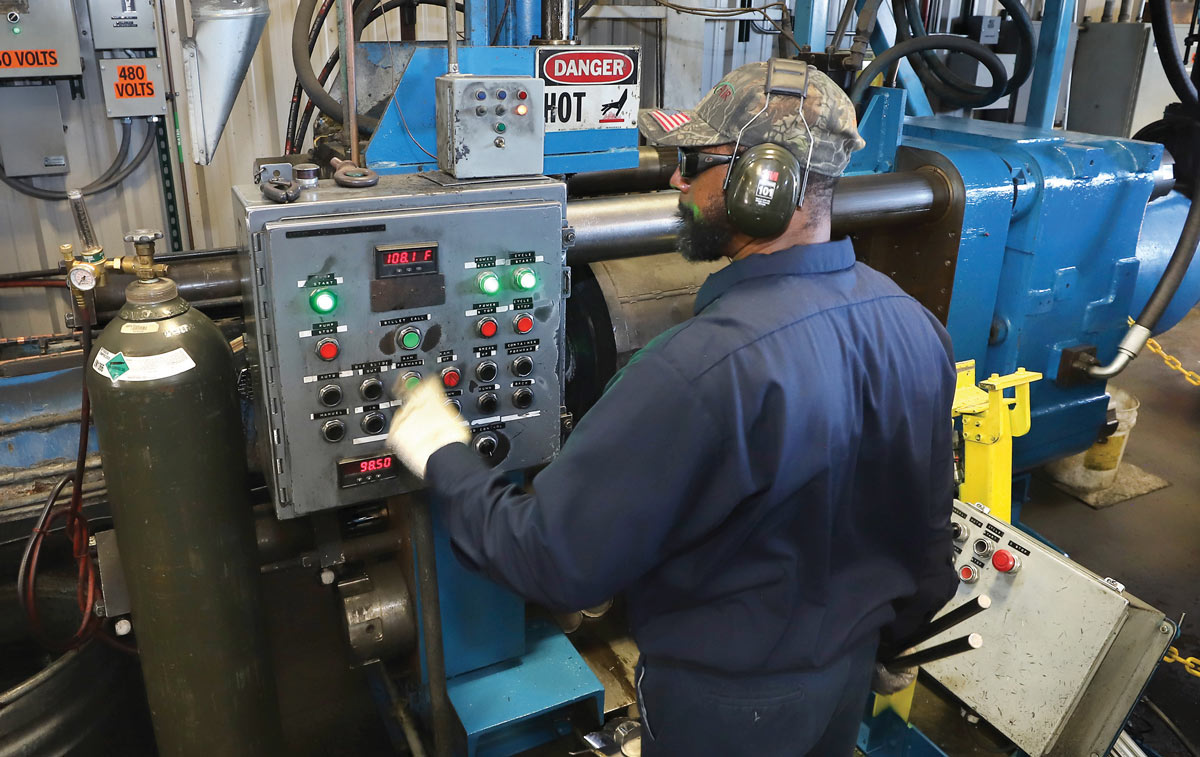ick Werner and John Tassone have 50-plus years of combined experience in the steel industry, and in tube production specifically. Werner was president of Independence Tube Corp., while Tassone was the general manager of sales and marketing. They were part of the management team that helped grow the company by over 400 percent, so it became the second largest structural tube company in the United States.
After Nucor purchased Independence Tube in 2016, Werner and Tassone were soon staying home collecting payments under employment contracts. But each wanted something more, so they formed a limited liability company (Xcite Manufacturing) and began looking for opportunities allowed by their noncompete agreements.
After examining several opportunities, they came across a company in Colorado Springs called Richardson Metals Inc. and purchased its assets in September 2018. They kept both the trade name and all of the non-retiring employees.
Richardson Metals is an aluminum extruder that focuses on small to medium runs requiring machined-tolerance precision. Werner is Richardson’s president, and Tassone is vice president. They hired Randy Rieke, who had 15 years of management experience in agricultural equipment manufacturing, to run day-to-day operations as general manager.
According to Tassone, Richardson Metals is an ideal candidate for highly focused growth. The former owners, he says, “were a corporate entity located 1,000 miles away in a completely different industry. When their on-site manager announced retirement, they were willing to sell. By bringing in new management and with our more concentrated oversight, we thought we could grow the business.”
Coincidentally, Rieke sought to relocate to Colorado from Nebraska because his children had flown the nest. Rieke’s employer was a customer of Independence Tube, so he was familiar with Richardson’s new owners.
With 22 employees, Richardson ships all across the United States and Canada and to the southern border for export to Mexico.
Today, says Tassone, “customers’ parts must fit within a 4-inch circle for us to be able to make them. We use aluminum billets from 2.9 to 4 inches to allow us to produce our shapes to machined tolerances. The shapes are can be very unusual and specific to a customer.
 we make custom runs of small quantities or even prototypes of very precise shapes.
we make custom runs of small quantities or even prototypes of very precise shapes. 
OEM customers for Richardson’s parts include Hunter Douglas and Northrop Grumman. “We make parts for sporting goods, medical offices, and our parts are in airplanes and even satellites,” Tassone says.
“We have heat treating capability to change temper. We have closely located partners to anodize or paint. We have two precision cutting lines and two CNC machines for placing holes and slots in parts, so we provide more of a one-stop shop.”
On the production floor, Richardson specializes in high-precision small parts. Customers send in a purchase order, “we review it, assess whether it is in our capabilities, and determine pricing. After acknowledging the order, we schedule it into our production,” according to Rieke.
If specs for a brand-new part come in, requiring a new die, the customer sends Richardson a drawing of the shape, then “we consult our own engineers to make sure the shape falls within our core competency,” he says. “Variables add to the complexity. We ask for the die maker’s recommendations, and then we ask the customer about volume and what lead time is required.”
Richardson Metals makes parts on four 10-hour shifts per week. “We eventually want to get to two shifts,” says Tassone. “Because the unemployment rate is so low in Colorado Springs, we have a hard time finding employees.”
The former owners never had an outside sales force at Richardson. “We hired four manufacturer’s reps we worked with formerly, and now they are making sales calls. Two of the four are experienced with our new product,” Tassone says.
“There was a lot of low-hanging fruit,” Werner says, in terms of better employing existing assets and securing additional business from existing customers. By making relatively modest investments in equipment, “our production capacity has increased over 35 percent, and we are running in a safer environment. We installed a new computer system to better track product flow and help expedite quoting to customers,” he adds.

A major goal for the new GM “is to change the culture of the company. Previous owners were not as involved,” Tassone says. “We are trying to get everyone on the same page. Get quotes out quicker, make parts perfectly and deliver as needed. Some of the people who weren’t on board fell by the wayside. Others are doing well.”
According to Rieke, Richardson Metals needed “someone in the plant to lead the team. The first task was changing the older culture. John and Rick’s shared vision is different —preaching teamwork, working for each other and not just for yourselves.
“We are doing more cross training, which helps to resolve bottlenecks or vacancies, and we are stabilizing the workforce by creating an environment where people want to come to work. I want to make sure employees feel they are valued, and that their being here means a lot to us,” Rieke says. “We are a small company. When someone is sick or on vacation, someone else has to step in and fill that role. We have laid out expectations for everyone.”
Rieke says the company seeks to continually improve quality. “That starts with awareness of what we are doing and how to meet customer expectations. Safety awareness is also paramount. People must be safe at work,” he adds.
According to Werner, “We brought principles with us that helped make us successful in the past and we try to replicate them in our new venture. We want to provide our employees with a stable and safe work environment. We work with our employees to increase production and quality. And we work to expand sales to provide better opportunities for all employees and our customers.”